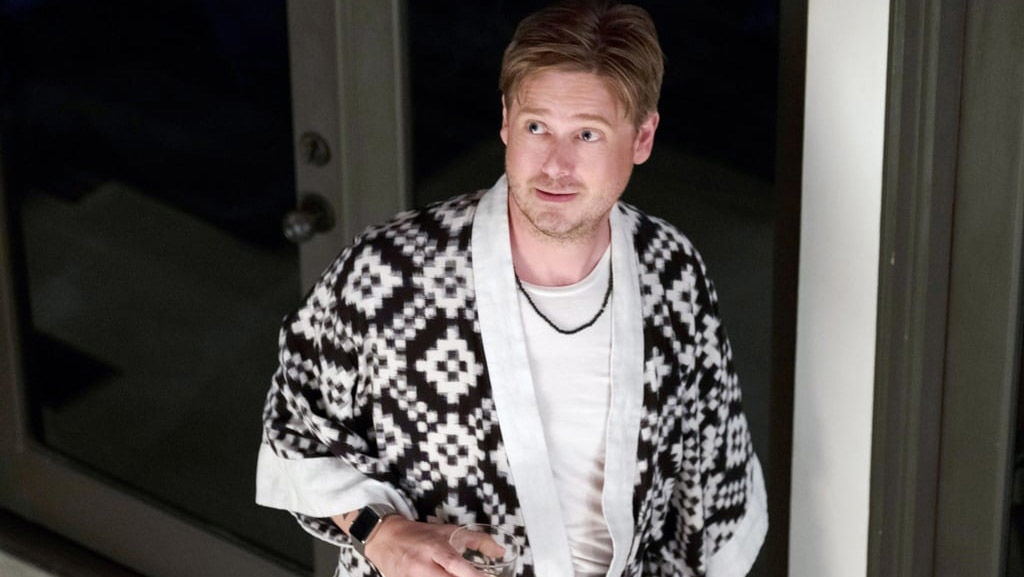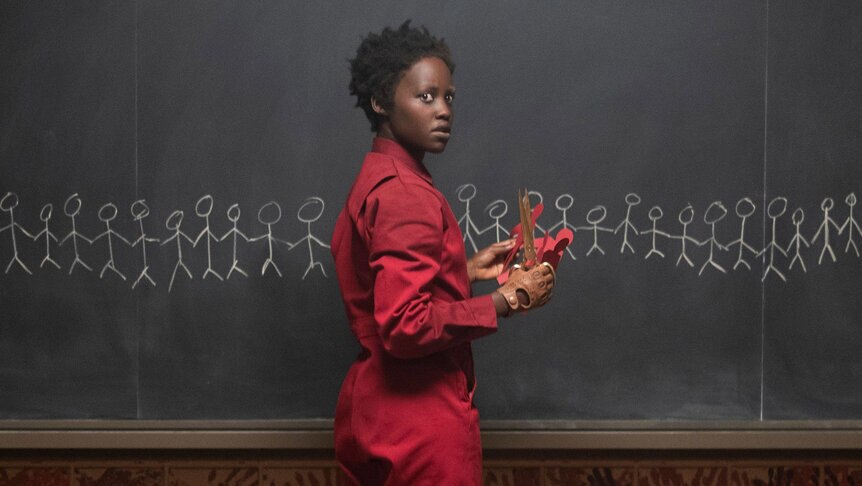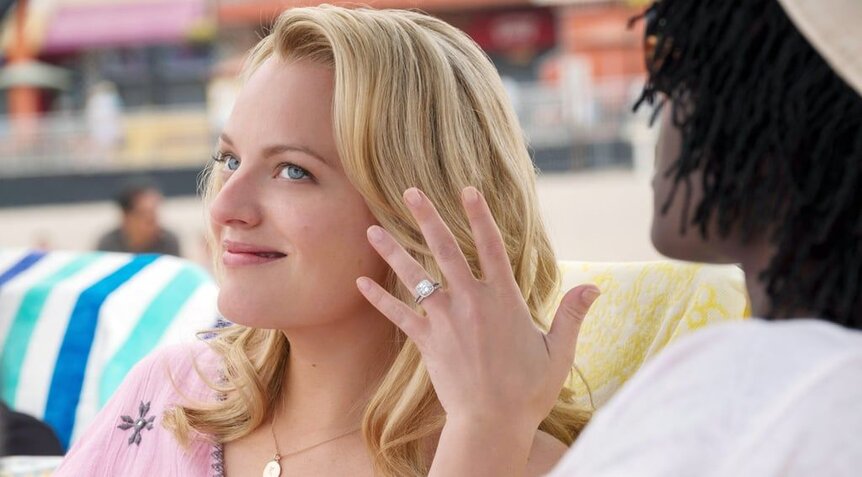Create a free profile to get unlimited access to exclusive videos, sweepstakes, and more!
Tim Heidecker brought his trademark douche-bro to Jordan Peele's 'Us'

As an actor, writer, director, and producer, Tim Heidecker has been a fixture in modern comedy for more than 15 years, turning odd ideas and even odder characters into a rich, enduring pastiche of skits, sketches, and stories. Despite Heidecker’s affinity for misfits, oddballs, and outsiders, the acclaim he’s received for Tim and Eric Awesome Show, Great Job! and subsequent projects created a wide variety of opportunities for him in everything from Bridesmaids to Fantastic Four, with dozens of independent projects in between testing his mettle in both drama and comedy.
But in Us, Jordan Peele’s blockbuster follow-up to Get Out, Heidecker flexes those same muscles to radically different effect, playing spoiled, dickish husband Josh Tyler and his goofy but indisputably deadly evil twin, Tex. His performance helps underscore the movie’s exploration of individual identity and American ideals, filtered through some wild and wonderfully frightening horror conceits.
SYFY WIRE recently spoke to Heidecker about his work on the film, where he collaborated closely with Peele — another comedian whose pedigree belies broader gifts he’s eager to explore — to fill in its rich and complex mythology, even when he didn’t always know how it was going to come together. Additionally, he talked about the themes and tropes of the horror genre that Peele and his collaborators were interested in exploring, and about expanding his own horizons as both an actor and a storyteller.
How important were the mechanics of the Us universe to understanding how to play both versions of this character?
I'm just there to help Jordan get the movie he wants, and I didn't feel like I needed to ask too many questions. We did a little bit of trial and error to figure out exactly what the tone of my character was going to be, so it was a combination of dialing in the look and the makeup and those mechanical things about the character to help me. But as far as all the subtext and intentions and everything, I didn't need to delve too deep and know everything.
Was there an agreed-upon interpretation of what the story was about when you started working on the movie?
Well, the politics of it all struck me right away, with the stabbings and these terrorist attacks, this random nihilistic violence happening around the world. That just sort of radiated off the script for me, the terror of the modern world and this global incident. But when Red says, “We're Americans,” it was clear that it was a reflection on who we're becoming — so that was there. But I got the full picture when I saw the movie. I think those early stages of the script and prep and stuff are more practically focused than a full understanding of Jordan's vision.
Were there any aspects of the movie or your character that surprised you to see on screen when the movie was done?
Yeah. We were trying to avoid some stereotypes and tropes of classic horror zombies, to avoid the classic “dead walk” kind of thing. So Jordan was pushing me to go wilder and sillier; the screeches and stuff were not something we talked about too much before shooting, but you have that opportunity to try things, and I'll do something that turns him on and then he was like, “More of that.” But you don't know exactly how that's going to play in the movie, so it was really neat and surprising to see how it became this unsettling, unique approach to what could have been a kind of by-the-book zombie approach.
Was there any consensus among the actors to determine what was the best way to create these reflections of the “ordinary” version of their characters?
We had a few conversations, but as far as Kitty (Elisabeth Moss) and Josh go, there was a little bit of us looking at each other and going, "Let's just improvise a little and see if it's feeling good." And luckily it was feeling good pretty quickly, so there wasn't a need to deliberate and over-examine it. Jordan did a good job, I think, of casting -- not to pat myself on the back -- but overall found the right people and some good chemistry amongst us. It never felt like homework or anything. It felt very natural and easy.
How does a director with a comedic pedigree facilitate your opportunities to explore the comedic aspects and then also make the horror that much more intense?
Jordan and I have the same vocabulary when it comes to comedy, and I think just in movies in general, so I have an appreciation for what he's trying to do, and I find that the environment that creates the most chance for success is collaborative and relaxed. The most important thing was that it was fun to be there and it was supportive and relaxed.
If I wanted to try something, I was free to try it; I wouldn't say there was a lot of improv, but I felt comfortable not hitting every line exactly the same way every time and just getting feedback from him, like “More of that.” At one point he was saying to me and Elisabeth, “I can just watch you guys bicker at each other all day.” That kind of stuff makes you feel comfortable, and when you're comfortable, you usually can do some decent work.
One thing I've always admired about your work is how willing you are to play characters who are unpleasant without necessarily trying to make them likable or relatable. Does a role like this give you a chance to kind of have your cake and eat it too, to kind of play a jerky guy and then to make fun of the jerk?
Oh yeah, I love it. I don't know what that says about me, but I can tap into a certain kind of man pretty quickly, who’s the kind of guy you don't want to be around. But Jordan helped make it not just a stock bad guy. There's a playfulness with him, and it's the kind of guy that has had it a little easy, and we wanted to make him a guy you can imagine a Kitty being constantly annoyed with. But there's a groundedness to him that he's not just a cartoon character or a jerk. We don't have a lot of time to get to know him, but he seems grounded and human. But then getting to play a pure evil, scary sicko in the few minutes that Tex is around, that was really fun as well.
Your comedy is so idiosyncratic. How difficult is it to find roles that give you enough room to explore that? Do you have to seek them, or do people see your work and make offers?
I wish it was a case where I had a hundred scripts in front of me and I’m trying to decide which one to do, but it really is this weird career where things pop up that I don't expect or I don't sort of ask for. There are some people out there and I'm grateful that they're out there, like Rick [Alverson] and Jordan; Jordan told me that The Comedy was one of his favorite movies, and that's where he thought of me for this movie.
So there's a little bit of a line from one thing to the next, but it's coming from these singular people out there who see something in what I do that they want to have in their picture. And that's been nice. I mean, it's already so narrow for there to be a project out there that suits me. I've said no to a few things here and there, trying to think what could I do that seems challenging or pushes me forward a little bit. But I'm just grateful when somebody thinks of me for something I can do and I get to do it.
You've done superhero movies, and now you’ve done horror. Are there genres in particular that as an actor or storyteller you would love to explore that you haven't before?
Something that interests me a bunch is trying to make a bigger comedy that I don't feel like they make anymore, in the tradition of the Steve Martin movies of the ‘70s or ‘80s, or the Gene Wilder movies where it's not the craziest thing, the raunchiest thing, but it's just funny and about something. Those movies are somehow not being made, and so I've been thinking a little bit about how to try to break through with something like that.
















